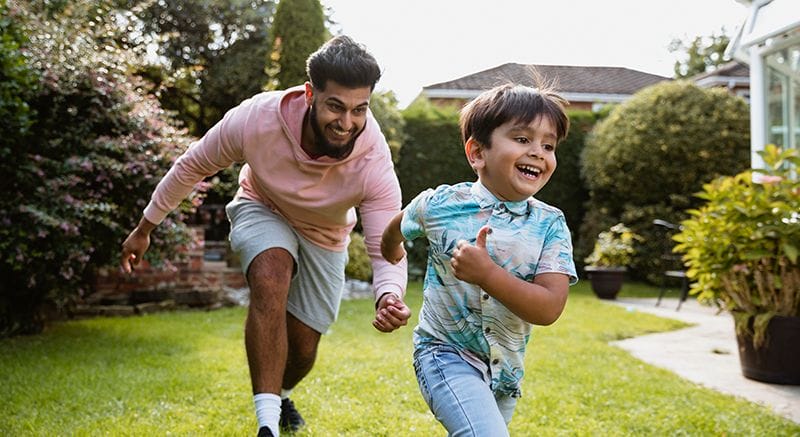Multi-generational homes, where kids, parents, and grandparents all live under one roof, are more common than ever. According to a Pew Research Center analysis of census data, the number of Americans living in multigenerational households has surged over the past five decades, rising from 14 million in 1971 to nearly 60 million by 2021. Today, this represents 18% of the U.S. population, a record share that highlights how common multi-generational living has become.

While these living arrangements offer countless benefits, they also bring unique security challenges. Balancing the safety needs of young children, busy adults, and aging seniors requires a thoughtful approach to home security.
Here’s how to keep every generation protected and confident at home.
Understanding Multi-Generational Household Security Needs
When multiple generations live together, the household has more foot traffic, visitors, and varied schedules. Kids may arrive home before parents, seniors might need caregivers coming and going, and everyone’s routines can change daily. These dynamics can leave your home more vulnerable to intrusions or accidents if not properly secured.
Multi-generational homes also face challenges like limited mobility for seniors, kids who don’t always remember to lock doors, and the need for clear, simple security controls everyone can use.
Essential Security Features for Multi-Generational Homes
Installing the right security features helps keep every family member safe:

- Smart locks: Eliminate lost keys by giving each family member their own secure code or app access.
- Door/window sensors: Receive alerts if doors or windows are left open, helping protect kids who may forget to close them.
- Motion detectors and home security cameras: Monitor common areas and exterior spaces for unusual activity.
- Video doorbells: Let children, adults, and seniors safely see who’s at the door before answering.
Childproofing and Teen Safety Tips
A secure multi-generational home needs to account for the youngest residents:
- Unintentional poisonings are a leading cause of injury for young children. Every hour, five kids are rushed to emergency rooms because they got into medicines, according to a report by Safe Kids Worldwide. Secure cabinets with locks to keep cleaning supplies and medicines out of reach and reduce these risks.
- Set up unique PINs or app permissions for teens so they can arm or disarm the system responsibly.
- Use alerts to know when teens arrive home, offering peace of mind when parents or grandparents aren’t there.
Keeping Seniors Safe and Confident
For elderly family members, a security system should be easy to use and offer reassurance:

- Provide seniors with key fobs or voice controls so they don’t have to remember PINs.
- Install environmental sensors like smoke or CO detectors connected to professional monitoring for emergency response even if seniors can’t call for help.
- Ensure hallways and entrances are well-lit to reduce fall risks. (Falls are a serious threat to older adults’ safety. In 2021 alone, 38,742 seniors died from unintentional falls, a rate of 78 deaths per 100,000 people aged 65 and older, according to the CDC’s Morbidity and Mortality Weekly Report.)
- Consider wearable medical alert buttons for immediate assistance.
Managing Access for Caregivers and Guests
Multi-generational households often rely on caregivers, babysitters, or household help. Manage their access with modern security solutions:
- Set up temporary PIN codes or app-based permissions for trusted helpers, then revoke access instantly when it’s no longer needed.
- Use video cameras to verify arrivals and ensure safety for your family.
Family Communication and Emergency Planning
In a busy household, everyone should know what to do in an emergency:
- Create and practice an emergency plan, including who to call and where to meet outside.
- Teach all family members, including seniors and kids, how to use the security system.
- Remind children never to open the door to strangers, even if they seem friendly.
Professional Monitoring: Peace of Mind for Every Generation
Professional monitoring adds an extra layer of security, especially important when family members may not be able to respond quickly themselves. With 24/7 monitoring, trained professionals can dispatch help right away, no matter who’s home and who isn’t. This can be a lifesaver for multi-generational families balancing work, school, and caregiving responsibilities.
Choose Home Security That Works for Your Whole Family
A multi-generational home deserves a security system that protects everyone—children, adults, and seniors alike. By combining the right devices, simple controls, and professional monitoring, you can create a safe, comfortable environment where your entire family can thrive.
For customized home security solutions designed for families of all sizes, contact Guardian Protection today at 800.776.8328.
Frequently Asked Questions
How can I make sure both kids and seniors can easily use a security system?
Choose systems with simple controls like key fobs, voice commands, or smartphone apps. Train each family member and do regular refreshers.
What’s the best way to give caregivers access without compromising security?
Set temporary PINs or app permissions so caregivers can enter your home when needed, then revoke access immediately when it’s no longer required.
Can one security system really meet the needs of all ages?
Yes, a professionally monitored system that includes smart devices and customizable access options can secure your home while keeping things simple for every family member.

